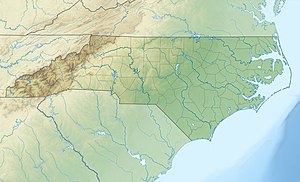Norkett Branch
| Norkett Branch Tributary to Lanes Creek | |
|---|---|
| Location | |
| Country | United States |
| State | North Carolina |
| County | Union |
| Physical characteristics | |
| Source | Little Brown Creek divide |
| • location | about 4 miles southwest of Sturdivants Crossroads, North Carolina |
| • coordinates | 34°51′57″N 080°21′22″W / 34.86583°N 80.35611°W[1] |
| • elevation | 491 ft (150 m)[2] |
| Mouth | Lanes Creek |
• location | about 1 mile northwest of Sturdivants Crossroads, North Carolina |
• coordinates | 34°54′49″N 080°21′07″W / 34.91361°N 80.35194°W[1] |
• elevation | 428 ft (130 m)[2] |
| Length | 4.21 mi (6.78 km)[3] |
| Basin size | 4.91 square miles (12.7 km2)[4] |
| Discharge | |
| • location | Lanes Creek |
| • average | 5.82 cu ft/s (0.165 m3/s) at mouth with Lanes Creek[4] |
| Basin features | |
| Progression | Lanes Creek → Rocky River → Pee Dee River → Winyah Bay → Atlantic Ocean |
| River system | Pee Dee River |
| Tributaries | |
| • left | unnamed tributaries |
| • right | unnamed tributaries |
| Bridges | Landsford Road, Leonard Morgan Road, White Store Road |
Norkett Branch is a 4.21 mi (6.78 km) long 2nd order tributary to Lanes Creek in Union County, North Carolina. This is the only stream of this name in the United States.[1]
Course
[edit]Norkett Branch rises about 4 miles southwest of Sturdivants Crossroads, North Carolina. Norkett Branch then flows generally north with curves to meet Lanes Creek about 1 mile northwest of Sturdivants Crossroads, North Carolina.[2]
Watershed
[edit]Norkett Branch drains 4.91 square miles (12.7 km2) of area, receives about 48.3 in/year of precipitation, has a topographic wetness index of 465.89 and is about 40% forested.[4]
References
[edit]- ^ a b c "GNIS Detail - Norkett Branch". geonames.usgs.gov. US Geological Survey. Retrieved 24 October 2020.
- ^ a b c "Norkett Branch Topo Map in Union". TopoZone. Locality, LLC. Retrieved 24 October 2020.
- ^ "ArcGIS Web Application". epa.maps.arcgis.com. US EPA. Retrieved 24 October 2020.
- ^ a b c "Norkett Branch Watershed Report". US EPA Geoviewer. US EPA. Retrieved 24 October 2020.


 French
French Deutsch
Deutsch
